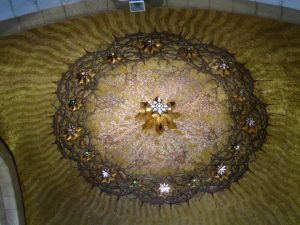Lectio Divina (Latin for “divine reading”) is a simple but powerful method of praying with Scripture that engages with four disciplines – reading, meditation, prayer and contemplation. The practice of Lectio Divina was first established in the 6th century by Saint Benedict (480–547 A.D.).
Lectio Divina combines reading scripture with prayer in a way that is transformational. It treats scripture not just as text to be grasped with our heads but as the ‘word of God’ that has the power to transform us from the inside out. Praying this way changes us.
Start with prayer. Make sure your heart is ready. Invite God to come and speak. Ask Him for wisdom and understanding. Most importantly, tell Him that you trust Him to speak to you and that you are willing to listen and obey.
Lectio (reading):
Read the passage. What does it say as a whole?
Read it again. This time, go line by line, pausing to meditate on what each line says.
Read again. This time, scan words and phrases and take time to ponder their meaning.
Meditatio (meditation):
Think over the passage you have just read. Remember, God speaks to us through scripture.
Ask, what is God saying to me?
Think about the words or phrases caught your attention during the reading? They contain God’s special message for you. (God speaks to each one of us as individuals. No two people will get the exact same thing out of the same passage. And a year from now, you might hear something different.)
Note down words and phrases that jumped out at you. Spend extra time meditating on that. Write down your impressions.
Ask yourself:
What is God saying specifically to me through this passage or verse?
What is God showing me at this moment?
How will this impact/change my life?
What are specific things I must do to follow through what God is showing me?
“In meditation we must welcome the word of God into our lives and turn it from a seemingly dead word to it’s own truthful lively state.”
Oratio (prayer):
Talk to God in silent prayer. This is your time to respond to Him.
Acknowledge God for who He is. Tell Him you trust Him. Thank Him for what He showed you through the passage you just read. If He showed you something you need to be sorry about, let Him know. Tell Him what your needs are. Talk to Him about what the passage is moving you to do. Ask Him for strength and wisdom.
Oratio includes spontaneous prayers of : Love, thanksgiving, sorrow, dedication, adoration, and petition.
If you feel led at this point, go back and read the passage again and spend more time meditating on it. You many want to read related passages that God may impress upon you.
Contemplatio (contemplation):
When you are finished reading, listening, and talking to God, rest in un-rushed silence. Sit quietly in His loving presence.
Take time to think about all that you have received and how it will now impact your life. Scripture is transformational. Ask: how do I live what God has just shown me? Write down your impressions.
Take time to absorb it all in.
Pray and ask God to help you be faithful with what you have just received.
End with thanking God for faithfully speaking to you and for inspiring you with His Word.
Lectio Divina provides a framework for reading, meditation and prayer. It is not a list of rigid rules to be followed! Let God lead you. Relax and move from one discipline into the other as He leads you and take all the time you need.
Duco Divina:
I am often asked at what stage in Lectio Divina do I doodle. Doodling helps me stay focused and attentive, specially in seasons of chronic pain when I have trouble concentrating on anything for more than few minutes at a time. It also helps me ‘assimilate’ what I meditate on better. I doodle at any stage after reading when I meditate, pray or contemplate; often through all of it.
The doodles that emerge are often filled with symbols that represent the thoughts and impressions that come to me during these times as God speaks to me through scripture.
~shini abraham, ©2016, duco divina – contemplative doodling


Recent Comments